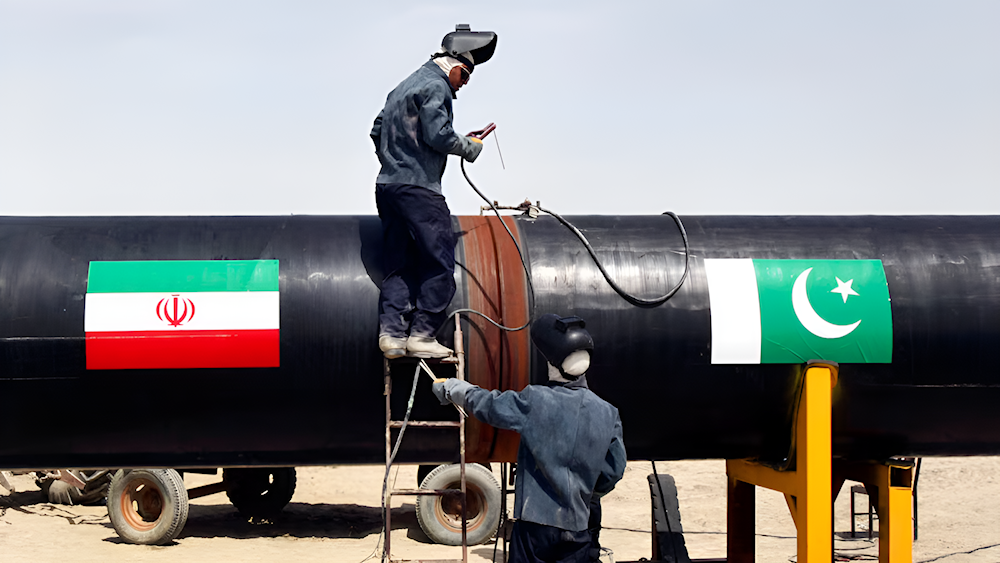Pakistan asserts right to import Iranian gas despite US objections
Pakistan's Foreign Ministry spokesperson says that Pakistan does not need a sanctions waiver to construct pipelines for importing natural gas from Iran.
-

Iranian welders work on a pipeline to transfer natural gas from Iran to Pakistan, in Chabahar, near the Pakistani border, southeastern Iran, March 11, 2013 (AFP)
Pakistan's Defense Minister asserted on Monday that his country has a legitimate right to import natural gas from Iran in the latest efforts to revive a 2009 gas agreement with the Islamic Republic despite Washington's objection.
In a press briefing following a parliament session, Khawaja Asif emphasized that Pakistan is entitled to benefit from the economically viable agreement with Tehran and emphasized that the US should consider Pakistan's challenges in importing energy at high prices from international markets. Asif highlighted that Iran could provide energy to Pakistan easily and at a reasonable price.
Meanwhile, he considered that the US is responsible for offering an alternative solution if it insists on opposing gas transfer from Iran to Pakistan.
Read more: 'Israel' behind attack on Iranian gas pipelines, NYT claims
These statements follow remarks from US Assistant Secretary of State Donald Lu at a Congressional hearing, where he stated that the US was actively opposing the Iran-Pakistan gas pipeline project.
Lu noted that Islamabad had not sought an exemption from US sanctions on Iran to facilitate gas trade.
However, responding to Lu's statement, Pakistan's Foreign Ministry Spokesperson Mumtaz Zahra Baloch clarified that Pakistan does not require a sanctions waiver to construct pipelines for importing natural gas from Iran.
Read more: US questions Pakistan election process amid Imran Khan allies lead
Bold and necessary decisions
In 2013, the US threatened Pakistan with economic sanctions over the Iran-Pakistan gas project, citing concerns about Iran's nuclear program. The project, also known as the "Peace Pipeline", was conceived in 1994 and involved India initially.
But Pakistan approved earlier the commencement of construction on an 80-kilometer pipeline from its border with Iran to the southwestern port city of Gwadar. This decision coincided with a deadline set by Iran, under the 2009 agreement, for Pakistan to begin pipeline construction or face international legal action.
Pakistani media outlets reported that the approved pipeline segment would allow the country to save over $5 billion a year on gas imports.
Read more: Iran, Pakistan pledge to advance IP gas project deal
According to the Gas Sales and Purchase Agreement signed in June 2009, Iran would supply Pakistan with 750 million to 1 billion cubic feet (up to 28.3 million cubic meters) per day of natural gas.
Despite Iran completing the construction of a 900-kilometer pipeline on its side of the border in 2011, the project has stalled.
The pipeline, which extends from the Iranian borderline to Gwadar port city in Balochistan province, is estimated to cost 45 billion Pakistani rupees while some knowledgeable sources reveal that Pakistan could avoid an $18 billion fine with this project.
After approving the 80-km pipeline project, Pakistani Senator Mushahid Hussain Syed posted on X: “Caretaker cabinet committee approves work on Iran-Pakistan gas pipeline.”
“About time bold & necessary decisions benefiting the interests of people of Pakistan were taken, the Iran-Pakistan Pipeline is absolutely vital for Pakistan’s Energy Security & Economic Independence!”

 3 Min Read
3 Min Read








